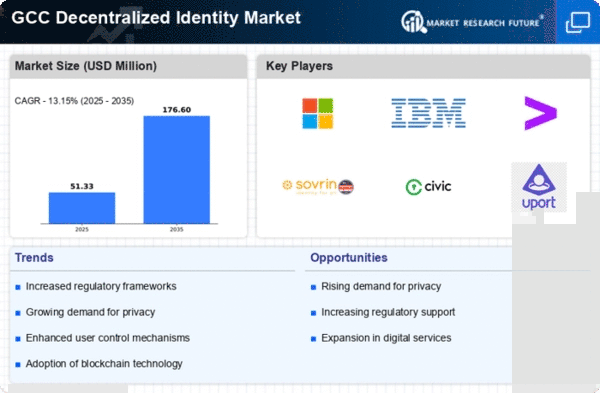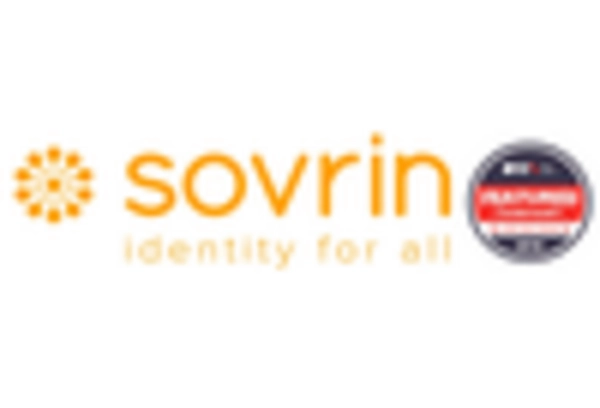Regulatory Compliance and Standards
The decentralized identity market is significantly influenced by the evolving landscape of regulatory compliance and standards within the GCC. Governments are increasingly recognizing the importance of establishing frameworks that support secure digital identities, which in turn fosters trust among users. Initiatives aimed at enhancing data protection and privacy regulations are prompting organizations to adopt decentralized identity solutions to ensure compliance. For instance, the introduction of data protection laws in various GCC countries is likely to drive the adoption of decentralized identity technologies. This regulatory environment not only encourages innovation but also positions the decentralized identity market as a critical component in achieving compliance with emerging legal requirements.
Increased Awareness of Cybersecurity Threats
The market is being propelled by a heightened awareness of cybersecurity threats among businesses and consumers in the GCC. As data breaches and identity theft incidents become more prevalent, organizations are recognizing the necessity of implementing robust identity management solutions. Decentralized identity systems offer enhanced security features that mitigate risks associated with traditional identity verification methods. This growing concern over cybersecurity is likely to drive investments in decentralized identity technologies, as companies aim to protect sensitive information and maintain customer trust. The market is expected to witness a significant uptick in adoption rates, with estimates suggesting a growth of 40% in the next few years as organizations prioritize cybersecurity measures.
Rising Demand for Digital Identity Solutions
The decentralized identity market is experiencing a notable surge in demand for digital identity solutions across various sectors in the GCC. This demand is driven by the increasing need for secure and efficient identity verification processes, particularly in financial services, healthcare, and e-commerce. As organizations seek to enhance customer trust and streamline operations, the adoption of decentralized identity solutions is projected to grow. According to recent estimates, the market is expected to reach a valuation of approximately $1.5 billion by 2026, reflecting a compound annual growth rate (CAGR) of around 25%. This growth indicates a robust shift towards digital identity management, emphasizing the importance of decentralized identity market solutions in meeting evolving consumer expectations.
Collaboration Between Public and Private Sectors
The market is benefiting from increased collaboration between public and private sectors in the GCC. Governments are actively engaging with technology providers to develop and implement decentralized identity solutions that enhance public services and streamline processes. This collaboration is fostering an environment conducive to innovation, as both sectors work together to address challenges related to identity verification and data management. Initiatives such as public-private partnerships are likely to accelerate the adoption of decentralized identity technologies, creating a more integrated ecosystem. The decentralized identity market is expected to thrive as these collaborative efforts lead to the development of comprehensive solutions that meet the needs of both citizens and businesses.
Technological Advancements in Identity Verification
Technological advancements are playing a pivotal role in shaping the decentralized identity market. Innovations in biometrics, artificial intelligence, and blockchain technology are enhancing the capabilities of identity verification systems. These advancements enable more secure, efficient, and user-friendly solutions, which are increasingly appealing to businesses and consumers alike. In the GCC, the integration of such technologies is expected to drive market growth, as organizations seek to leverage cutting-edge solutions to improve their identity management processes. The decentralized identity market is likely to benefit from these technological trends, with projections indicating a potential market size increase of 30% by 2027, as businesses prioritize security and user experience.
















